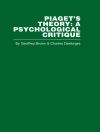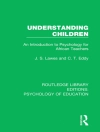This major text provides the first comprehensive anthology of the key topics arising in the philosophy of psychology. Bringing together internationally renowned authors, including Herb Simon, Karl Pribram, Joseph Rychlak, Ullin T Place and Adolf Gr[um]unbaum, this volume offers a stimulating and informative addition to contemporary debate.
With the cognitive revolution of the 1960s, there has been a resurgence of interest in the study of the philosophical assumptions and implications of psychology. Several significant themes, such as the foundations of knowledge, behaviourism, rationality, emotion and cognitive science span both philosophy and psychology, and are covered here along with a wide range of issues in the fields of folk psychology, clinical psychology, neurophysiology and professional ethics.
表中的内容
Introduction
PART ONE: EPISTEMOLOGY, PSYCHOLOGY OF SCIENCE AND THE FOUNDATIONS OF PSYCHOLOGY
Naturalism and the Abandonment of Normativity – Harvey Siegel
Psychology, Naturalized Epistemology and Rationality – Harold I Brown
Social Epistemology and Psychology – Steve Fuller
Psychology of Science – Michael E Gorman
Genetic Epistemology and Cognitive Psychology of Science – Richard F Kitchener
PART TWO: BEHAVIORISM, PSYCHOLOGY AND PHILOSOPHY
Behaviorism as Opposition to Cartesianism – Max Hocutt
Quine′s Behaviorism – Roger F Gibson
Skinner′s Theory of Theories – Richard F Kitchener
Linguistic Behaviorism as a Philosophy of Empirical Science – Ullin T Place
Skinner′s Case for Radical Behaviorism – Richard Garrett
Must Behavior Be Mechanistic? Modeling Nonmachines – Joseph F Rychlak
PART THREE: COGNITIVE SCIENCE AND PSYCHOLOGY
Computational Theories of Cognition – Herbert A Simon
Troubles with Computationalism – Mark H Bickhard
Toward a Naturalized Cognitive Science – C A Hooker
A Framework for Cooperation between Philosophy and the Natural Sciences of Intelligent Systems
Neurobehavioral Science, Neuropsychology and the Philosophy of Mind – Karl H Pribram
Typical Emotions – Aaron Ben-Ze′ev
[ITAL]`Folk Psychology′ and Its Implications for Psychological Science
Introduction – Ullin T Place
The Falsity of Folk Theories – Nick Chater and Mike Oaksford
Implications for Psychology and Philosophy
Does Science Underwrite Our Folk Psychology? – Barry C Smith
Folk Psychology from the Standpoint of Conceptual Analysis – Ullin T Place
On the Necessary Survival of Folk Psychology – Graham Richards
Folk Psychology and Its Implications for Cognitive Science – Elizabeth R Valentine
Discussion
PART FOUR: CLINICAL PSYCHOLOGY AND PHILOSOPHY
Is Psychoanalysis Viable? – Adolf Gr[um]unbaum
The Value of Psychoanalytic Therapy – Edward Erwin
A Question of Standards
What Is an Irrational Belief? Rational-Emotive Therapy and Accounts of Rationality – William O′Donohue and Jason S Vass
PART FIVE: ETHICS AND PSYCHOLOGY
The Formation and Transformation of Values – Hugh Lacey and Barry Schwartz
Prescriptions for Responsible Psychiatry – Joseph Agassi
The Behavior Therapist′s Dilemma – Jon Ringen
Reflections on Autonomy, Informed Consent and Scientific Psychology
Professional Codes of Ethics and Ongoing Moral Problems in Psychology – Karen Strohm Kitchener
A Critical Examination of the Ethical Principles of Psychologists and Code of Conduct – William O′Donohue and Richard Mangold
关于作者
William T. O’Donohue is a licensed clinical psychologist, professor of psychology and adjunct professor in the Department of Philosophy at University of Nevada, Reno, and a faculty member of the National Judicial College. He is widely recognized in the field for his proposed innovations in mental health service delivery, in treatment design and evaluation, and in knowledge of empirically supported cognitive behavioral therapies. He is a member of the Association for the Advancement for Behavior Therapy and served on the Board of Directors of this organization. Dr. O’Donohue has published over 50 books and 150 articles in scholarly journals and book chapters. For the past 14 years, he has been director of a free clinic that treats children who have been sexually abused and adults who have been sexually assaulted.












